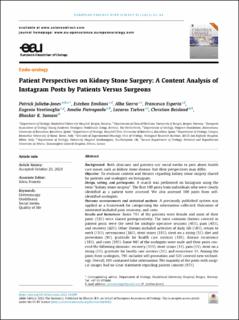| dc.description.abstract | Background
Both clinicians and patients use social media to post about health care issues such as kidney stone disease, but their perspectives may differ.
Objective
To evaluate content and themes regarding kidney stone surgery shared by patients and urologists on Instagram.
Design, setting, and participants
A search was performed on Instagram using the term “kidney stone surgery”. The first 100 posts from individuals who were clearly identified as a patient were assessed. We also assessed 100 posts from self-identified urologists.
Outcome measurements and statistical analysis
A previously published system was applied as a framework for categorizing the information collected. Outcomes of interested included pain, recovery, and costs.
Results and limitations
Some 71% of the patients were female and most of their posts (52%) were shared postoperatively. The most common themes covered in patient posts were the need for multiple operative sessions (45%), pain (43%), and recovery (42%). Other themes included activities of daily life (18%), return to work (11%), nervousness (16%), stent issues (31%), stent on a string (5%), diet and prevention (9%), gratitude for health care services (10%), disease recurrence (18%), and costs (10%). Some 94% of the urologists were male and their posts covered the following domains: recovery (11%), stent issues (3%), pain (1%), stent on a string (1%), gratitude for health care services (1%), and recurrence 1%. Among the posts from urologists, 79% included self-promotion and 52% covered new technology. Overall, 10% contained false information. The majority of the posts with surgical images had no clear statement regarding patient consent (97%).
Conclusions
Kidney stone surgery can affect many areas of a patient’s quality of life. Most of the posts shared by patients were negative. Posts shared by urologists do not reflect the same themes. Moreover, there appears to be poor adherence to European Association of Urology recommendations regarding online professional conduct.
Patient summary
Many patients use social media to share their experiences of kidney stone surgery. Posts are largely related to quality-of-life issues and are mostly negative. While urologists also use social media, the content they post on professional accounts is mostly focused on new technology and career promotion. | en_US |

